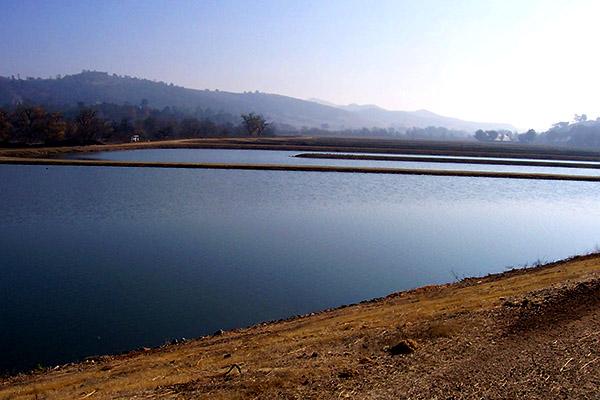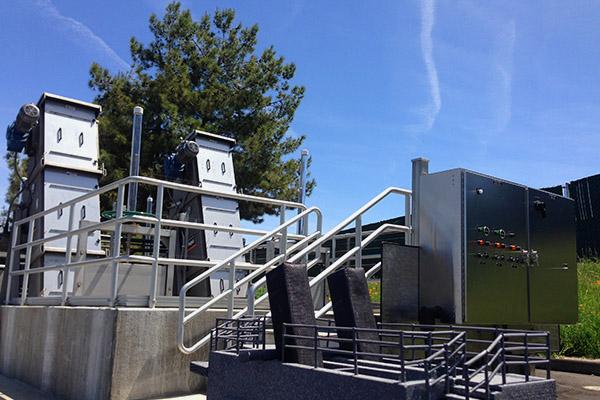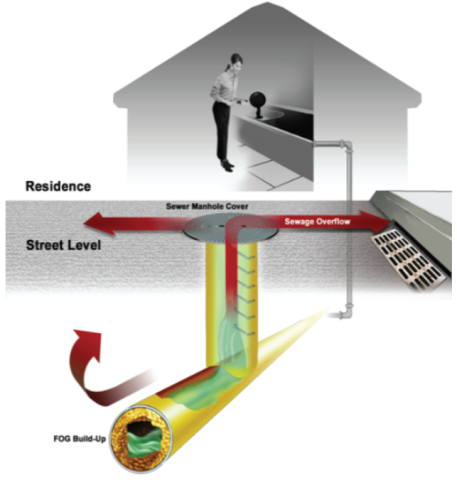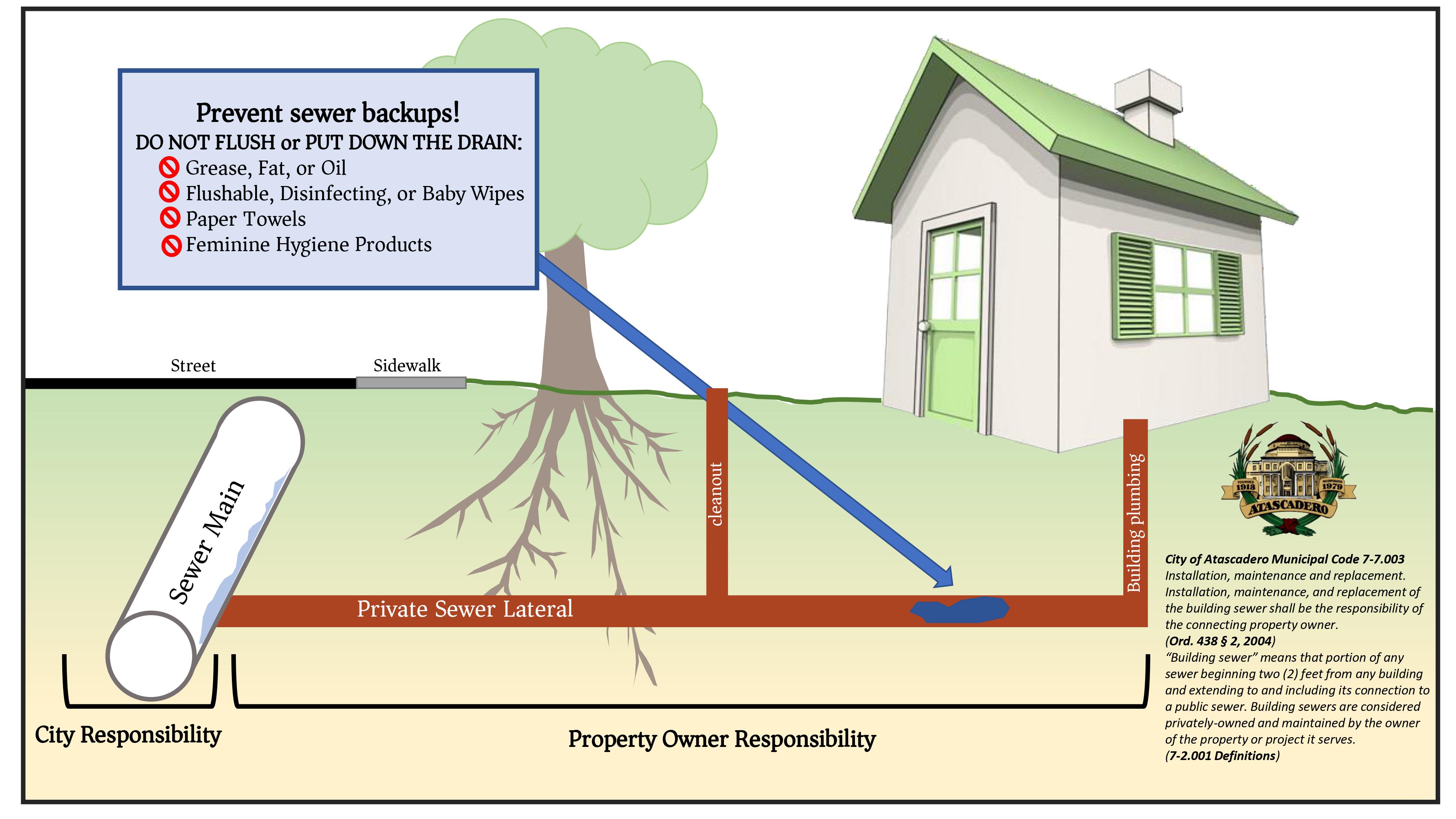The Wastewater Division provides wastewater (sewer) collection and treatment service for certain areas of the City, including approximately one-half of the residents and a majority of the businesses. The Division maintains and operates a 2.39-million-gallon monthly maximum average flow wastewater treatment facility, over 66 miles of pipeline and 12 wastewater pumping stations. The Division also reclaims water for irrigation of the Chalk Mountain Golf Course and percolates effluent for Atascadero State Hospital.
To report an emergency sewage spill, immediately call the Atascadero Police Department at (805) 461-5051.

Collection & Treatment
Wastewater Treatment Plant Operators are responsible for the collection and treatment of the City’s sewer system. Collection services include cleaning, maintaining, repairing wastewater mains (both force mains and gravity mains) and lift station. A lift station pumps or lifts the waste stream from low lying areas to higher lying areas, so gravity can carry the flow to the Water Reclamation Facility for treatment. They also participate in identifying the sewer system as part of Underground Service Alerts (USA's) for construction projects. Homeowners are required to maintain the lateral from their home, to the main sewer line, typically located in the street, or nearby easement. Maintaining the lateral includes keeping the lateral line flowing and free of debris such as roots, or grease.

Water Reclamation Facility
The City of Atascadero’s Water Reclamation Facility (WRF) is located east of the Chalk Mountain Golf Course. Groundwater reclaimed from below the facilities infiltration ponds is used for fairway irrigation. The WRF consists of an aerobic, facultative, polishing lagoon and six percolation ponds. The facility’s design flow is 1.4 million gallons a day (MGD). Operations, maintenance, and environmental compliance staffs guarantee the WRF is operated and maintained in the most efficient manner possible and complies with all regulatory requirements. The WRF also produces Class B biosolids. In addition, the WRF receives the final effluent discharged by the Atascadero State Hospital’s wastewater treatment plant to the sixth and final percolation pond.
Wastewater Billing
Customers connected to the City’s sanitary sewer system are billed a fixed charge for the City’s service to collect and treat the wastewater, which is called a sewer service charge or wastewater service charge. This fixed rate methodology is used since the City is not the water supplier and does not have access to individual customer water consumption data without the customer’s consent. The fixed charge used by the City is based upon Equivalent Dwelling Units (EDUs), where one EDU is the basis for a single family residence (SFR) service charge, based upon an estimated average daily flow of 240 gallons of wastewater and wastewater strength provided by the customer. Other connection users are assigned a multiple or fraction of an EDU based upon expected average daily flow and strength of wastewater compared to that of SFR. For example, an apartment or condo is 0.75 EDUs and charged 0.75 times that of a SFR service charge, and a restaurant with less than 40 seats is four EDUs and charged 4 times that of a SFR service charge. The City currently has about 8,500 EDUs in the system.
Sewer service charges are collected by placing a levy each year on the property taxes of individual customers through San Luis Obispo County. The City provides data to the County including the Assessor’s Parcel Number (APN) and the associated sewer service charge being levied on the property. The charge is included as a line item on the customer’s property tax statements. Revenue from sewer service charges is paid to the City twice each year. For questions about wastewater billing, please call (805) 470- 3180.
Proposition 218
Under Proposition 218, the City of Atascadero is required to hold a protest hearing for certain property-related fees, assessments, and charges prior to creation or increase. The City mailed notices of the proposed rate adjustments to all possibly affected addresses and out-of-town property owners. The City will be holding a formal public hearing at City Hall on Monday, June 10, 2025 at 6:00 p.m., prior to any adjustments taking effect.
A list of frequently asked questions has been included below, but if you have additional questions or concerns related to the Proposition 218 Public Hearing for the proposed rate adjustments, please call the Public Works Department at (805) 470-3456.
Si habla español y tiene preguntas sobre este mensaje, favor de comunicarse con Cindy Chavez al (805) 470-3484.
Frequently Asked Proposition 218 Questions
What is Proposition 218?
Proposition 218, or the “Right to Vote on Taxes Act”, was approved by California state voters in November 1996. The Act amended the California constitution to require local governments to follow certain procedures when they impose fees for certain kinds of services in order to ensure that they are subject to voter approval. Prop 218 is a tool designed to provide greater public involvement in the rate setting process.
How can I protest the proposed rate adjustments?
You may mail or hand deliver a signed protest form to the City Clerk’s Office, 6500 Palma Avenue, until the close of the public hearing on June 10, 2025. You have the right to submit a protest for each parcel you own connected to the City’s sewer. Resolution No. 2019-033 establishes the City’s procedures for the submission and tabulation of Prop 218 protests.
What needs to be included in my protest?
(1) State that the identified property owner is in opposition to the proposed increases to the wastewater rates;
(2) Provide the location of the identified parcel (by street address or assessor’s parcel number (APN);
(3) Include the printed name and original, wet signature of the property owner submitting the protest;
(4) Date the protest was signed; and
(5) Certification by the named property owner that the contents of the protest are true and correct.
Your signed protest must also be delivered in a sealed envelope and have “Attn: Protest Wastewater Rate Increase" written on the outside in order to properly identify and account for the vote.
How can I support or vote “yes” on the proposed rate adjustments?
If you do not wish to oppose the proposed rate adjustments, no action is necessary. By not submitting a protest form, you are showing your support for the rate adjustments. You may also attend the public hearing on June 10 to voice your support.
When will a decision be made?
Following the Public Hearing, if the proposed rates are upheld, the City Council will vote on the rate adjustments as presented. The new rates will then be adopted via Resolution. If adopted, the Resolution with the new wastewater service charges will go into effect for all residential and business customers on or after July 10, 2025, following a 30-day period. The revised charges will be reflected on property tax bills mailed after July 15, 2025.
Can I call, email, or fax in my protest vote?
No, Proposition 218 requires a written protest with a signature.
How can I learn more about the proposed rate adjustments?
City Council Staff Reports and the detail for the proposed rate adjustments. A wastewater rate analysis is available for the public at City Hall, 6500 Palma Ave., during normal business hours Monday through Friday.
How many protest or “no” votes are required to stop the proposed rate adjustments from taking effect?
Proposition 218 requires a simple majority of 50 percent of the parcel owners, plus one.
Why are we proposing to raise the rates by these amounts?
The proposed amounts were carefully decided upon after determining the cost of providing wastewater services and critical upgrades and/or replacement of wastewater facilities, as well as the City's existing financial resources. For an additional $8.91 per month for the typical residential customer beginning July 1 this year, the City will be able to maintain the necessary schedule to make the needed repairs and improvements, and fund ongoing operational costs and maintenance.
When was the last time we raised the water and sewer rates?
The last rate increase was in 2023. Prior to that, rates were raised only five times over the last 25+ years.
Why can’t we pay for these expenses out of the normal City budget?
Cost to operate the wastewater treatment and collection systems to ensure continued, safe, reliable utility services cost approximately $2,000,000 each year. In addition, there are over $173 million in capital improvement projects planned over the next ten years. Most of these projects are to replace and modernize aging infrastructure at the end of its useful life, and to meet ever increasing and stricter State regulatory requirements. Coupled with increasing operational costs, the scale goes beyond the capacity of the normal City budget. Wastewater funds are generated from the wastewater connection and service charges. Only parcels connected and benefiting from City sewer services are billed these charges. There are over 11,000 parcels in the City and about half of those parcels receive sewer service.
I heard about rate increase, but didn’t receive paperwork. How can I get a copy?
You can download the Proposition 218 notice here.
Where can I find my sewer bill?
Sewer charges are billed annually on your San Luis Obispo County property tax bill. You can view your property tax bill online at https://services.slocountytax.org. The sewer charge is shown on the tax bill as ATAS SEWER CHARGE.
When will the proposed rate increases take effect?
The new wastewater service charges will go into effect for all residential and business customers on or after July 10, 2025.
How long will these rates be in effect?
The rates will remain in effect indefinitely or until new rates are proposed and another Prop 218 protest hearing is held.
What is the consequence if the proposed rate increases are voted down?
The rate increase is needed to maintain the current level of service for all wastewater customers, pay for needed repairs and improvements, as well as fund ongoing operating and maintaining costs for the collection and treatment systems for wastewater. Without these rate increases, much needed infrastructure maintenance and improvements would lack funding and the public could see reduced levels of service.
Are accommodations being made for people on fixed incomes who can't afford a rate increase?
Unfortunately, it is not possible to offer discounted rates to fixed income residents without making up the discount from some other source, and state law (Proposition 218) prohibits any property owner from being charged more than their proportional cost of service. In other words, the City can’t subsidize some of its customers by overcharging other customers.
Protecting Residential and Commercial Sewer Systems
The crews inspect and clean the sanitary sewer mains on a scheduled basis, but there are some things that you can do to prevent issues with your home or business’s sewer system.
Residential & Commercial Sewer Systems Information
Proactively maintaining your residential and commercial sewer systems helps to protect you against potentially costly repairs in addition to helping keep the City’s sewer system free flowing. Below you will find information and tips on how to care for your residential or commercial sewer system.
Please do the following
- Use only a licensed contractor or plumber to make any repairs. State law requires that any contractor performing more than $500 of work is required to have a contractor’s license. Having a licensed contractor or plumber is very important when working on sewer systems as there are a number of unique hazards in sewer work.
- Maintain your private sewer lateral. The line running from your home out into the street is referred to as a sewer lateral. This lateral is the property of, and the responsibility of the homeowner. If your lateral is improperly maintained it can lead to costly repairs and sewer spills.
- Deposit all cooking grease, eggshells and coffee grounds in the trash. While it may seem harmless to dump that hot grease down the drain, cooking grease as it cools will congeal and form a solid mass blocking the flow of sewage in either your private lateral or in the sewer main.
- Recycle motor oil, paint, and other toxic materials at:
Chicago Grade Landfill
2290 Homestead Road, Templeton, CA
Hours: Saturday 11 am - 3 pm
Map & Directions
Please do not do the following:
- Dig without calling Underground Service Alert at 800-642-2444.
- Plant trees directly over a sewer line. Root growth in sewer lines is problematic.
- Pour chemicals, cleaners, motor oil or solvent down the sewer (Chicago Grade Landfill takes these items.)
- Put cooking grease or eggshells down drains or in garbage disposal.
- Use an unlicensed or unknown contractor to make repairs.
- Dispose of medical wastes, dental floss, clothes, baby wipes, diapers, rubber gloves, or similar items down the drain. These items can easily clog sewer pumps and in many cases pose a hazard to both the environment and the Collections system workers.
- Flush unwanted medications down the drain. These materials can remain in the environment and in some cases pass through our treatment process intact. In response to a growing demand for a safe and convenient way to dispose of household medications, including prescription and over-the-counter drugs, your local pharmacies and the SLO County IWMA have teamed up to provide a FREE home generated disposal program. Click here for more information.
FOG Prevention
"Fats, Oils, and Grease" (FOG) means any substance such as a vegetable or animal product that is used in, or is a by-product of, the cooking or food preparation process, and that turns or may turn viscous or solidifies with a change in temperature or other conditions.
Protect our environment. Keep drains clear of Fats, Oil and Grease (FOG). FOG build-up in sewer pipes is costly to clean, requiring local Public Works staff to go to the site to remove the blockage.
Sources of FOG
Fat, Oil and Grease are by-products of cooking found in: food scraps, meat fats, cooking oil, butter, margarine, and shortening.

Negative Effects of FOG
- Expensive and unpleasant cleanup
- Property damage from sewage backups that may not be covered by insurance
- Sewage overflows in streets or rivers
- Attracts insects and rodents
- Higher operation and maintenance costs for local sewer departments and residents from cleaning FOG build-up
Keep our environment clean and avoid unnecessary maintenance costs by keeping fat, oil and grease out of our sewers.
Keep Drains Clear
Follow These Tips:
- Pour or scrape greasy and oily food waste into a container.
- Allow grease to cool or freeze in the container before throwing it in the trash.
- Mix liquid vegetable oil with an absorbent material such as cat litter or coffee grounds in a sealable container before throwing it in the trash.
- Keep drains clean by pouring 1/2 cup baking soda down the drain followed by 1/2 cup vinegar. Wait 10 to 15 minutes and then rinse with hot water.
Install strainers in sink drains to catch food scraps/solids.
Do Not
- Pour fat, oil or grease down drains or garbage disposals.
- Use hot water to rinse grease off cookware, utensils, dishes or surfaces.

Impact of FOG
Preventing sewer backups from FOG blockages saves residents money and protects the environment. When sewer pipes on private property back up, the homeowner is responsible for the cleanup. For example, if a resident regularly pours grease down a drain, it will eventually cool, harden and form a blockage in the sewer pipe. Sewage then backs up through floor drains and toilets at the lowest point in the house. A plumber will have to be hired to clean the sewer and possibly repair plumbing inside the home and cleanup costs can be expensive.
In addition to keeping drains clear of fat, oil and grease you can also help prevent sewer blockages by never flushing:
- Disinfecting Wipes
- Baby Wipes
- Toilet Cleaning Pads
- Any products that are not biodegradable
- Moist Towels
- Paper Towels
- Mop/”Swiffer” Refills
For Information on FOG prevention, please call the City of Atascadero at (805) 470-3140.
Resources
FAQs
Where can I find my sewer bill?
Sewer charges are billed annually on your San Luis Obispo County property tax bill. You can view your property tax bill online at https://services.slocountytax.org. The sewer charge is shown on the tax bill as ATAS SEWER CHARGE.
Are accommodations being made for people on fixed incomes who can't afford a Wastewater (sewer) rate increase?
Unfortunately, it is not possible to offer discounted rates to fixed income residents without making up the discount from some other source, and state law (Proposition 218) prohibits any property owner from being charged more than their proportional cost of service. In other words, the City can't subsidize some of its customers by overcharging other customers.
Who do I contact if I see a sewage (wastewater) spill?
If you see a sewage spill, immediately call the Atascadero Police Department at (805) 461-5051.
Who do I contact if I smell a strong sewer (wastewater) odor?
Please contact Public Works Operations at (805) 470-3148.





